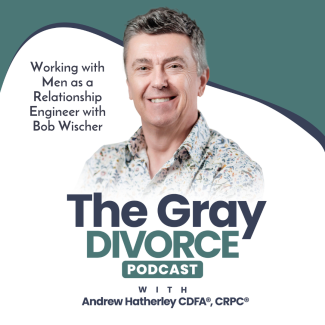
The Gray Divorce Podcast: Episode 40 Working with Men as a Relationship Engineer with Bob Wischer
In Episode 40 of The Gray Divorce Podcast, Andrew chats with Life and Health Coach Bob Wischer. A self-described “relationship engineer” Bob is the founder of Heart Forged Coaching and the host of the Men Becoming Better Men podcast.
Among the topics covered:
-
Bob discusses his work as a relationship engineer, and how it ties in with skills used in his work in the automotive industry.
-
The unique challenges of working with men going through divorce; how it can be more difficult for men to open up to other men and to express themselves vulnerably as they go through relationship challenges.
-
The likelihood that a man will be blindsided by divorce, given that women tend to initiate late-life divorce.
-
The “Social” penalty that men face in gray divorce.
-
Health declines.
-
Greater overall feelings of loneliness and social isolation
-
Deteriorating relationships with adult children.
-
Higher risk of adopting bad habits (i.e. overeating, alcohol, drugs).
-
-
The genesis of Bob’s podcast Men Becoming Better Men
-
His positive experience receiving coaching led him to become a coach.
-
-
The physical and psychological benefits of healthy habits
-
Going to the gym and keeping fit.
-
The social connections of physical activities such as CrossFit.
-
-
Bob’s process when working with clients focuses on three main areas.
-
Integrity
-
Being true to oneself and acknowledging one’s strengths and weaknesses.
-
-
Connection
-
The importance of social activities that are integral to one’s personality in fostering connection with others. Bob and Andrew cite examples of two male acquaintances finding social connections through barbershop quartets and the other with playing the ukelele.
-
-
Purpose
-
Fulfillment can be derived by helping others. The concept of flow and losing track of time when engaged in an activity that inspires and energizes us.
-
-
Bob and Andrew discuss using our strengths or skill sets in conjunction with activities that fulfill us.
-
Bob’s three questions to ask ourselves to derive keywords to determine our purpose:
-
1) What do we value?
-
2) How do we present those/put them out into the world?
-
3) What is your ideal view of the world?
-
Create a sentence out of the words that arise from these questions. Bob’s sentence: “I use my desire to serve and my faith to inspire and encourage others to be physically, mentally, and spiritually healthy.”
-
-
The concept of Ikigai and finding a purpose based on four key factors:
-
What do we love?
-
What are we good at?
-
What does the world need?
-
Can we be paid for this activity?
-
-
-
How giving of yourself can contribute to personal growth after divorce. And how the benefits of giving can often exceed receiving.
-
How reflecting on our childhood selves can help us find purpose in late life.
Resources
www.menbecomingbettermen.com

